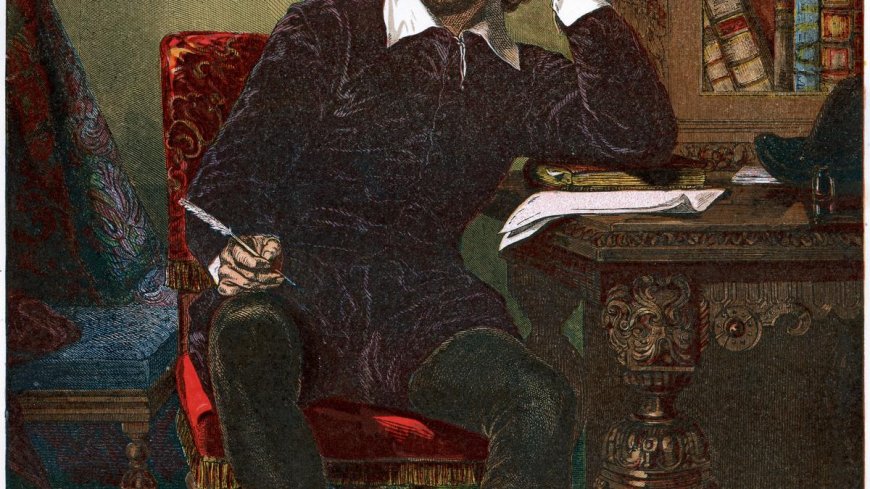The Bard’s magical lines

The Bard’s Magical Lines: Why Shakespeare's Words Still Enchant Us Today
Asarkari - Sarkari News, Jobs & Updates
By Anjali Mehta
Introduction: The Enduring Echo of Avon
Four centuries after his quill fell silent, the words of William Shakespeare, the famed Bard of Avon, continue to echo through the halls of literature, theatre, and even our everyday conversations. What is it about his lines that feel so potent, so timelessly magical? From the soaring romance of Romeo and Juliet to the profound existential questions posed by Hamlet, Shakespeare crafted phrases that capture the very essence of the human condition. His ability to articulate complex emotions, societal observations, and philosophical quandaries in uniquely memorable ways remains unparalleled. This enduring relevance isn't just academic; it's woven into the fabric of the English language and our understanding of ourselves.
kam sabdo me kahein to, this article explores the timeless appeal and enduring magic of William Shakespeare's famous lines, examining why they still resonate powerfully across generations and cultures.
Universal Themes, Timeless Truths
One key reason for the enduring power of Shakespeare's lines lies in their exploration of universal human themes. Love, loss, ambition, jealousy, revenge, joy, despair, duty, betrayal – these are experiences that transcend time and culture. When Hamlet contemplates "To be, or not to be: that is the question," he voices an existential doubt that resonates with anyone who has questioned the meaning of life and suffering. It’s not just the theme, but the *way* he expresses it – concise, profound, and unforgettable.
Similarly, Juliet’s musing, "What's in a name? That which we call a rose / By any other name would smell as sweet," challenges the arbitrary nature of labels and societal divisions, a sentiment still deeply relevant in discussions about prejudice and identity. Shakespeare didn't just write *about* these themes; he distilled their emotional core into language that feels both poetic and deeply true. His characters, whether kings or commoners, grapple with dilemmas that mirror our own, making their words feel personal and insightful even today.
Memorable Lines That Shape Language
Beyond the thematic depth, the sheer linguistic brilliance of Shakespeare's writing contributes to its magic. He possessed an extraordinary knack for coining phrases that are both evocative and rhythmically pleasing. Consider lines like:
"All the world's a stage, / And all the men and women merely players;" (As You Like It) – A perfect metaphor for the roles we play in life.
"The course of true love never did run smooth." (A Midsummer Night's Dream) – An eternally relatable observation about romantic relationships.
"Something is rotten in the state of Denmark." (Hamlet) – A phrase now widely used to suggest underlying corruption or problems.
"To thine own self be true," (Hamlet) – Enduring advice on authenticity and integrity.
"All that glitters is not gold." (The Merchant of Venice) – A timeless warning about deceptive appearances.
These are not just quotes; they have become idioms, woven into the tapestry of modern English. Shakespeare is credited with introducing hundreds of new words and phrases into the language, from "eyeball" and "bedroom" to "swagger" and "lacklustre," and phrases like "break the ice," "wild-goose chase," and "foregone conclusion." His innovative use of language expanded its possibilities and continues to influence writers and speakers. This linguistic legacy ensures his lines remain vibrant and actively used, further cementing their magical quality.
Shakespeare in the Modern World
The magic isn't confined to dusty library books. Shakespeare's plays are constantly reinterpreted on stage and screen, finding new relevance for contemporary audiences. Directors explore modern parallels, highlighting how issues of power, politics, gender, and social justice in his plays resonate with current events. This adaptability speaks volumes about the depth and foresight embedded in his writing. His lines are endlessly quotable, appearing in speeches, articles, and everyday discussions, often used to lend weight or insight to a point. For aspiring writers and lovers of language, studying his work remains a masterclass in rhetoric, character development, and poetic expression. For more insights into literary figures and cultural updates, you might explore resources like https://asarkari.com.
Conclusion: The Unfading Spell
The magical lines of William Shakespeare endure because they speak to the core of human experience with unparalleled eloquence and insight. They explore universal themes, showcase linguistic genius, and possess a remarkable adaptability that keeps them relevant centuries later. The Bard’s words are more than just text; they are living echoes of humanity’s joys, sorrows, and follies, continuing to enchant, provoke, and inspire. His spell remains unbroken, a testament to the timeless power of masterful storytelling.
- Team Asarkari
Keywords
William Shakespeare quotes, famous Shakespeare lines, Shakespeare impact on English, Bard of Avon meaning, Shakespeare relevance today, memorable Shakespeare quotes, universal themes in Shakespeare, English literature history, theatre quotes, famous playwrightsWhat's Your Reaction?
 Like
0
Like
0
 Dislike
0
Dislike
0
 Love
0
Love
0
 Funny
0
Funny
0
 Angry
0
Angry
0
 Sad
0
Sad
0
 Wow
0
Wow
0









































